La Llorona Visits the American Academy of Religion: A Tribute to Luís D. León
Honoring a pioneering Latinx scholar of religion with the wailing female spirit known as La Llorona.
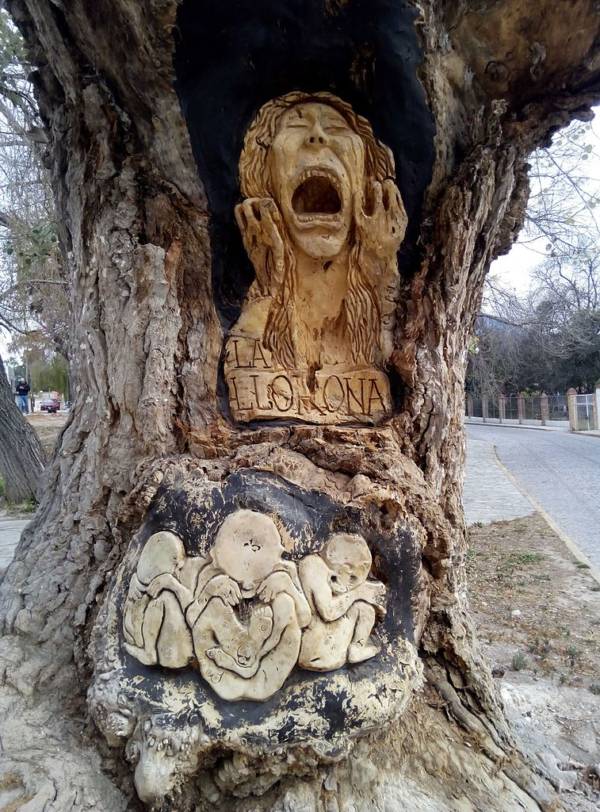
Carving of La Llorona by Gabriel Perez Salazar
One of my first memories of Luís D. León, a renowned scholar of Latinx religious practices, is helping him construct a Days of the Dead altar for one of his undergraduate classes. He asked each student to bring an object that represented a dead loved one to place on the makeshift altar. I’d only met Luís three months before, when I arrived at the University of Denver from southern California to begin my Masters’ program in Religious Studies. I was touched by the invitation and the opportunity to participate in an activity that reminded me of my family and community. As a first generation Chicana graduate student, I was happy to join a celebration that connected me to my home. I don’t remember what object I took to the event, only that Luís pulled a small plastic lion out of his pocket—“Un león, for my father.” Luís set it on the table with pride for his dad, the deceased Reverend Daniel León.
Luís died of natural causes on October 16, 2018. He was 53 years old. After the initial shock wore off, his close friends and colleagues wanted to do something for him the next month during the annual American Academy of Religion (AAR) meeting, a gathering of religion scholars from around the world, in the city he’d called home for over a decade, Denver, Colorado.
A group of five of us video conferenced to brainstorm and plan an event, but the usual recommendations of panel presentations fell flat. The memory of Luís was still too fresh, our pain still immediate, and the conference approaching fast. We wondered aloud to each other: How would we honor and remember Luís in a way that reflected his playfulness, his clever and biting wit, and the critical contributions of his academic work?
One of us mentioned an altar. Someone else added that it should be a moving altar. Eventually someone joked, “We should have La Llorona haunt the AAR.” We all laughed and then nodded in agreement. It was the perfect suggestion, as Luís used the Mexican legend of La Llorona, the wailing female spirit, as the namesake of his first book. We decided to construct an image of La Llorona and wheel her throughout the conference for the duration of the annual meeting.
Luís published La Llorona’s Children: Religion, Life, and Death in the United States-Mexican Borderlands in 2004. A study of the religious diversity of Chicanx and Mexicans in Mexico and the United States, the book title is based on the Mexican folk legend of La Llorona.

La Llorona, a cautionary and tragic tale of the apparition who is condemned to roam the world in search of her murdered children, is also a story of the Mexican-United States borderlands. The legend of La Llorona is ubiquitous among Mexican and Mexican-American communities. Some trace the story to pre-Hispanic mythologies of the serpent goddess, Cihuacoatl, the first mother, who can be heard weeping as she wanders the night dressed in white. Others understand her through the framework of colonialism, as the ghost of La Malinche (first known by the name Malintzin, and later Doña Marina), the infamous indigenous translator and consort of Hernán Cortés, who has been subject to various historical narratives as a traitor who helped the Spanish conquer the Aztec empire and the symbolic mother of modern Mexicans. The significance in her part of La Llorona myth derives from a tradition of vilifying La Malinche, the woman who betrayed her nation and her people, and folk stories of her killing her son to prevent Cortes from taking him. Both La Llorona and La Malinche have been imagined as condemned to search for their dead children, lost in grief and regret.
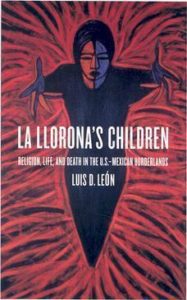 Luís’ portrayal of La Llorona uses Chicanx feminist ideas to reinterpret this mythological tale. Luis describes La Llorona’s children as the descendants of Mexicans in the post-colonial diaspora to include those who live in the United States. Luís uses the tale as a metaphor for his academic pursuits—like La Llorona, he searches for children across the borderlands and identifies them through local forms of religious practices that provide meaning to marginalized communities. In Luis’ scholarship of Mexican and Chicanx practices of Roman Catholicism and Pentecostalism, he recognizes ancestral ties to pre-Hispanic indigenous traditions amidst contemporary religious innovations. Like the wandering mourning mother, Luís followed narratives of transnational migration and religion. He searched for her children across the borderlands and found them (alive!) and embodying religion and identity in temples, botánicas, and store front churches in spite of institutional forces that rendered them invisible. Luís worked continuously to construct an ethical position within post-colonial violence, just as La Llorona searched for her family, for forgiveness, and for justice.
Luís’ portrayal of La Llorona uses Chicanx feminist ideas to reinterpret this mythological tale. Luis describes La Llorona’s children as the descendants of Mexicans in the post-colonial diaspora to include those who live in the United States. Luís uses the tale as a metaphor for his academic pursuits—like La Llorona, he searches for children across the borderlands and identifies them through local forms of religious practices that provide meaning to marginalized communities. In Luis’ scholarship of Mexican and Chicanx practices of Roman Catholicism and Pentecostalism, he recognizes ancestral ties to pre-Hispanic indigenous traditions amidst contemporary religious innovations. Like the wandering mourning mother, Luís followed narratives of transnational migration and religion. He searched for her children across the borderlands and found them (alive!) and embodying religion and identity in temples, botánicas, and store front churches in spite of institutional forces that rendered them invisible. Luís worked continuously to construct an ethical position within post-colonial violence, just as La Llorona searched for her family, for forgiveness, and for justice.
***
On Saturday night, November 17, 2018, in the lobby of a Denver conference hotel, Luís’ friends and colleagues gathered to create a set of ofrendas, offerings. Family and friends constructed a table altar with objects and art from his home. Upstairs, another group of us constructed a less conventional offering: La Llorona, veiled in black to cover her crystal tears, resting on a mobile catering cart decorated with white votive candles and a scattering of the same orange flowers that we used to make her crown. With hands outstretched, she held small buttons printed with an image of “El León,” beckoning people to approach her, to leave an offering, or take a button. The front of the cart was decorated with the Mexican pride flag, secured with large paper flowers. The tribute reflected Luís’ multiple identities—queer, Latinx, and scholar of religion—identities he fought hard to maintain and make present. He made it his life’s work to create spaces for Latinx women and queer people of color.
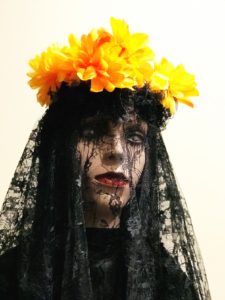 We wheeled La Llorona downstairs, and together the group of us completed the largest of the ofrendas—in community, Luís’s friends, colleagues, mentees, and family celebrating his memory.
We wheeled La Llorona downstairs, and together the group of us completed the largest of the ofrendas—in community, Luís’s friends, colleagues, mentees, and family celebrating his memory.
Carting La Llorona through the halls of the Denver Convention Center, at panel presentations, and receptions, created an alternative mode for experiencing the event – it imbued the conference with our memories of Luís and our shared connection through those memories. As La Llorona interacted with people putting on their león pins, we began to see a visual representation of how many lives Luís touched. This network invoked his memory through nods of mutual recognition, smiles, and waves. There were also moments of disgust and confusion — La Llorona was an aesthetic and spatial disruption to the conventional conference atmosphere of business casual outfits and long sterile hallways.
Sometimes we introduced La Llorona when she arrived at a panel; often she simply sat in the corner of conference rooms, her black veil hiding her face as academics read their papers and discussed their scholarship. She was invited to sit in on the emergency session on the Catholic Church sexual abuse crisis, and she sat next to the podium during the Religion in Latina/o Americas panels that Luís helped create. La Llorona represented our mourning and loss of Luís, but she also beckoned to the possibilities for future scholarship following his example. La Llorona bore witness to the loss of one of our own, but also to the possibilities that Luís’ work created for the future.
***
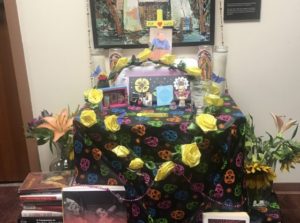
Altar for Luís D. León – University of Denver
I think about Luís often—in my teaching, scholarship, and personal life. I left the University of Denver in 2012, but my relationship with Luís grew stronger as I pursued a Ph.D. at the University of California, Riverside. We were reflections of each other’s choices to be academics—scholars of religion, unmarried, and child-free. Between conferences, Luís visited Riverside and the Los Angeles area. His colleagues soon became my colleagues—he gave me the gift of community. Luís was my academic father, quick to take me under his wing and provide rigorous critique. His scholarship continued to inform my doctoral work, and his comments and advice were formative as a I continued my research among Latinx communities in the U.S.-Mexico borderlands. In the last year of his life, we corresponded regularly about applying to tenure-track positions and research opportunities. Luís was proud of my appointment as Assistant Professor in Religious Studies and Classics at the University of Arizona. His last email to me was a reminder to apply to the Young Scholars of American Religion Program–advice that I am eternally grateful to have received.
While I remember Luís as an academic mentor, my favorite memories are much more personal. I remember his sunglass-clad face riding in the passenger seat of my car when he’d visit southern California, his emails signed “El León,” the club lights in his dark hair, his laughter at introducing me to strangers as his daughter. I can imagine him watching academics pose with La Llorona at the AAR, laughing with joy even amidst the tragedy.
***
In haste, we packed La Llorona into a cardboard box with her flowers and her votive candles at the end of the conference. When I collected her from the baggage carousel in the Tucson airport, rattling sounds of broken glass warned me against removing her from the box. I’m unsure about whether she’ll make another appearance; I imagine the shards of glass have formed thorns on the orange flowers. La Llorona won’t journey to San Diego for this year’s American Academy of Religion conference, but we will participate in another ofrenda instead. 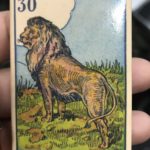
Last year, La Llorona’s specter haunted the conference with memories of Luís; this year, we answer her call as we gather to remember Luís in a panel presentation that imagines the future of Religious Studies from the perspectives of his mentors, colleagues, and mentees. Many of us will be wearing the Leon button with pride, as members of Luís’s pride. I’ll be sitting there too, with a small plastic lion on the panel table.
Daisy Vargas is an Assistant Professor in the Department of Religious Studies and Classics at the University of Arizona. She is currently writing a book manuscript tentatively titled, Mexican Religion on Trial: Race, Religion, and the Law in the U.S.-Mexico Borderlands.
***
Published with support from the Henry R. Luce Initiative on Religion in International Affairs.